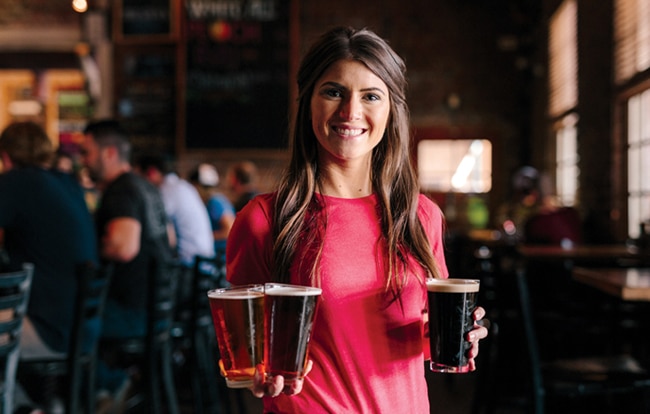Brewscape: The Latest Craft Beer Brand News
Pizza Hut Expands Beer Delivery to Nearly 300 Stores
More than a year after launching beer deliveries throughout Phoenix, Arizona, Pizza Hut has announced plans to expand the service into 1,000 stores by mid-2019.
The national pizza chain, owned by Yum Brands, said it would expand its beer delivery service into five new states – Florida, Iowa, Nebraska, North Carolina and Ohio – by mid-January. The company also plans to offer beer deliveries from more restaurant locations in Arizona, as well as California, where it launched the service last May.
In a press release, Pizza Hut called the expansion of its beer delivery program “a brand priority.”
“We are proud to be pioneers of beer delivery and are well-poised to take on more markets in the coming year,” Pizza Hut chief brand officer Marianne Radley said, via the release.
In an email, a Pizza Hut spokesperson said the company was “committed to improving the modern pizza experience.”
Pizza Hut’s initial slate of brews available for delivery are produced by three major beer companies: Anheuser-Busch InBev (Bud Light, Budweiser, Busch Light, Four Peaks Brewing Kilt Lifter, Michelob Ultra, Shock Top, Stella Artois), MillerCoors (Blue Moon, Coors Light, Miller Lite, Miller High Life) and Constellation Brands (Corona Extra). Prices range from $3 to $5 per 2-pack and $6 to $12 per 6-pack.
“The beers we’ve selected are among the most popular in the United States,” the spokesperson told BevNET Magazine. “We didn’t want to handcuff our customers to one or two beer selections because we know they like variety – and this list of offerings achieves that.”
The pizza chain does not currently sell any offerings from independently owned craft breweries, however. The spokesperson explained that the first phase of the rollout is focused on popular mainstream offerings, and the company would “evaluate craft beer opportunities in the future.”
US Beer Sales Top $35 Billion in 2018
Total U.S. beer dollar sales grew to more than $35 billion in 2018, according to retail data provider IRI.
The Chicago-based market research firm, which tracks category-wide sales at major off-premise retailers, reported a 1.8 percent increase in beer dollar sales, despite a 0.3 percent decline in volume sales at multi-outlet and convenience (MULC) stores (grocery, drug, club, dollar, mass-merchandiser and military) through Dec. 30.
Dollar sales of domestic premium brands (Bud Light, Budweiser, Miller Lite, Coors Light, and others), declined 4.2 percent, to more than $12.6 billion last year.
Meanwhile, five segments – imports, craft beer, domestic super premiums, flavored malt beverages and cider – grew dollar sales in 2018. Dollar sales of imported beer, the beer category’s second-largest segment behind domestic premium, increased 7.4 percent, to more than $7 billion.
Dollar sales of craft beer increased 2.5 percent, to more than $4.2 billion, last year. However, sales decelerated from 2017’s increase of 5.6 percent. In fact, 17 of IRI’s top 30 craft brands posted dollar sales declines in 2018.
At the same time, three segments grew dollar sales double-digits in 2018. Sales of domestic super premiums were up 15.2 percent, to $2.9 billion, while sales of flavored malt beverages grew 10.7 percent, to nearly $2.6 billion. Sales of cider also grew 10.1 percent, to more than $433 million. Other segments, like domestic sub-premiums and non-alcoholic beers, were in decline, however.
Texas Lawmakers Propose Companion Bills to Legalize To-Go Sales
Craft breweries in Texas are once again pushing for the legalization of beer-to-go sales.
A pair of companion bills that would make Texas the final U.S. state to permit to-go sales from licensed breweries were filed in both chambers on Jan. 8, the first day of Texas’ 2019 legislative session.
Introduced by Texas state Sen. Dawn Buckingham (R-Lakeway) and state Rep. Eddie Rodriguez (D-Austin), the bills – Senate Bill 312 and House Bill 672 – would enable manufacturing breweries to sell beer for off-premise consumption.
Currently, Texas beer producers that hold manufacturing licenses are only allowed to sell up to 5,000 barrels of beer for on-premise consumption, while the state’s brewpubs, as well as wineries and distilleries with similar manufacturing permits, are allowed to sell their products for off-premise consumption.
In a press release issued by the Texas Craft Brewers Guild, which is advocating for the passage of the bill, Rodriguez said his bill “corrects a glaring disparity in the state’s alcohol laws.”
“The fact is, 49 other states already allow consumers to purchase beer-to-go when they visit a local brewery,” Rodriguez said via the release. “Texas should be a leader when it comes to supporting small businesses, not the last horse to cross the finish line.”
According to the Texas Craft Brewers Guild, the proposed changes would not impact how much beer licensed manufacturing breweries are allowed to sell directly to customers, it would just give those companies the opportunity to sell the beer to-go.
The Texas Legislature, which convenes for 140 days, operates under a biennial system. If the Texas breweries are unsuccessful in their attempts to lobby for brewery to-go sales, they won’t be able to revisit the issue until 2021.


Receive your free magazine!
Join thousands of other food and beverage professionals who utilize BevNET Magazine to stay up-to-date on current trends and news within the food and beverage world.
Receive your free copy of the magazine 6x per year in digital or print and utilize insights on consumer behavior, brand growth, category volume, and trend forecasting.
Subscribe